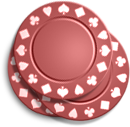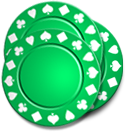



A bet can be described as a statement of strength and confidence. When a poker player makes a bet, they are saying that they believe they have the best hand at the table. Or so you would think. In reality poker players also bet when they simply want you to believe that they have the best hand. This approach is obviously known as bluffing, and although most amateur players bluff far too often, it is a very useful tool to have in your strategic arsenal. We discuss bluffing in depth on a separate page, but in the meantime here are some suggestions on various ways to bet effectively.
If you're on the button and everyone has folded apart from the small and big blinds, you can bet. The blinds must then call your bet to stay in the hand, whereas previously they could have just checked. In many cases the blinds will fold meaning that you have effectively "stolen the blinds". The bigger your bet, the greater the odds of the blinds folding, but if one of them has a strong hand they may still call, so don't go overboard. Also bear in mind that if you have a very strong hand it might be more profitable to bet modestly so that the pot has a chance of growing.

This is where you are in an early position and you bet just to get everyone but the players with the strongest hands to fold, thereby "buying information" about who has a hand that is really worth playing. Buying information is fine now and again, but only if you have a good hand of your own, otherwise you're just spending money on a poor bluff. Overuse of this technique will also tend to antagonise your opposition, making them play more aggressively in order to "get you back", and that's always a good thing!
You can often reduce the number of players left in a hand by betting when everyone else has simply checked. Obviously you need to be the last to act to know that this is the case, but a bet in this position in these circumstances will usually result in several folds. Another advantage is that the remaining players will tend to be more cautious and fold more willingly should you bet again after the next card. But beware - if you do this too often players will soon catch on and deliberately slow-play great hands to try and trap you, this is known as...
You check a strong hand, hoping that another player will feel confident enough to bet, at which point you raise them. Most players will call the raise, increasing the size of the pot and - if your hand is as strong as you think - your profit from the hand. This is an excellent technique when you are in the driving seat, but if you are the victim of a check-raise because you've been trying to "reduce the opposition" too often, it will cost you.
If you are in a short-handed game and you have what you believe is the best hand with your opponents needing to draw, betting will make it more expensive for them to see the next card. You therefore reduce their pot odds and make them more likely to fold.

